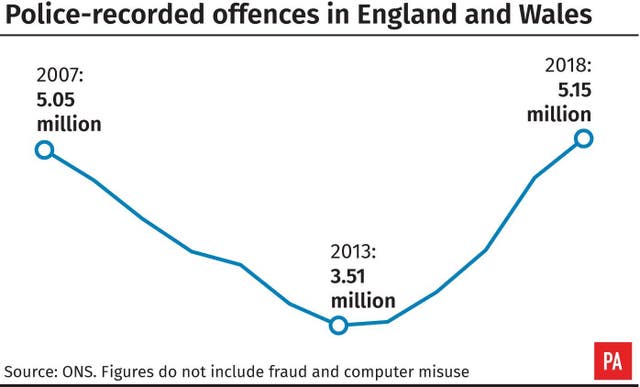
Knife crime reached a record level last year in England and Wales, while there was the highest number of homicides for more than a decade, official figures show.
Police recorded 40,829 offences involving knives or sharp objects in 2018, an increase of 6% in a year and the largest total since comparable data began in 2011.

The number of homicides last year stood at 732, the highest in any calendar year since 2007 when it hit 765.
The data released on Thursday by the Office for National Statistics (ONS) came after a spate of knife crimes involving young people triggered a political row over cuts to police funding.

One of the latest killings was that of an 18-year-old man stabbed to death in the Harborne area of Birmingham on Wednesday evening.
Shadow home secretary Diane Abbott said the “deeply troubling” figures show “these reckless cuts must end”.
"Ministers are in denial, refusing to accept that their cuts to police forces have had any impact either on crime levels or the ability to apprehend the criminals." – @HackneyAbbott https://t.co/q9V7y5Xs9w
— Labour Press Team (@labourpress) April 25, 2019
Fellow Labour MP Yvette Cooper, who chairs the Home Affairs Select Committee, said the “disturbing increase” in violent crime comes as arrests continue to fall.
“The police are completely overstretched and crime prevention work is far too limited,” she said.
“The problem of violent crime is going to get worse unless the Government acts, and it is families and communities across the country who are paying a terrible price.”
Homicides, which include murder and manslaughter, increased 6% in the 12 months leading up to December compared with the year before.
The majority of police forces (31 out of 43) recorded an increase in knife offences in the year ending December 2018 https://t.co/OxwnK96ETw pic.twitter.com/gV5uVFeJlP
— ONS (@ONS) April 25, 2019
The ONS release showed an increase in knife offences in 31 of the 43 police forces across the two nations.
The Metropolitan Police recorded the largest volume, at 14,660, but this was an increase of just 1% in a year.
Merseyside was up 35% and North Yorkshire 21%, while British Transport Police saw an increase of 54%.
The 40,829 offences involving knives or sharp objects were reported across the forces excluding Greater Manchester Police, which records data differently.
When comparable records began in 2011, this figure stood at 30,627.
The number of violent offences recorded by police was more than 1,608,500 last year – a 19% increase on 2017.
However, the Crime Survey for England and Wales (CSEW) suggested there was no overall increase in violent offences.
The ONS considers the CSEW a better indication of overall trends for this type of offending because lower-level attacks may be picked up in the survey but not reported to officers.
The total number of crimes recorded by police was 5.8 million, which was 7% more than in 2017.
Policing minister Nick Hurd said the Government would continue “our urgent and unprecedented action to reverse this terrible trend”.
He said greater powers have been granted to officers, more than £1 billion has been funnelled into policing and that a greater emphasis was being put on prevention.
Mr Hurd also said that separate figures from the Metropolitan Police released on the same day show “action to tackle violent crime is having an impact”.
The Met’s statistics for the financial year ending in March suggested a 25% drop in homicides to 122 from 163 in the previous period, as well as a decrease in stabbings.
But Barnado’s chief executive Javed Khan said the ONS figures “confirm we are now living through a knife crime crisis” and urged action to prevent condemning “future generations to live in an endless spiral of violence”.
“Children are not born with knives in their hands. They don’t feel safe. And they don’t believe there’s an alternative on offer – too many see little or no possibility of a positive future – what we call a ‘poverty of hope’,” he added.


Comments: Our rules
We want our comments to be a lively and valuable part of our community - a place where readers can debate and engage with the most important local issues. The ability to comment on our stories is a privilege, not a right, however, and that privilege may be withdrawn if it is abused or misused.
Please report any comments that break our rules.
Read the rules here